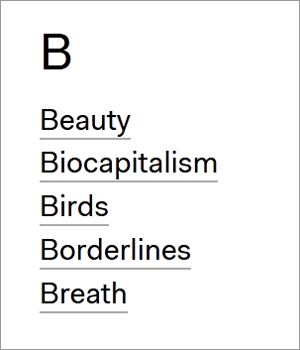Janet Roitman: Anti-Crisis (2013)
Filed under book | Tags: · anthropology, capitalism, critique, financial crisis, history, knowledge, narrative, risk, value

“Crisis is everywhere: in Iraq, Afghanistan, Syria, and the Congo; in housing markets, money markets, financial systems, state budgets, and sovereign currencies. In Anti-Crisis, Janet Roitman steps back from the cycle of crisis production to ask not just why we declare so many crises but also what sort of analytical work the concept of crisis enables. What, she asks, are the stakes of crisis? Taking responses to the so-called subprime mortgage crisis of 2007–2008 as her case in point, Roitman engages with the work of thinkers ranging from Reinhart Koselleck to Michael Lewis, and from Thomas Hobbes to Robert Shiller. In the process, she questions the bases for claims to crisis and shows how crisis functions as a narrative device, or how the invocation of crisis in contemporary accounts of the financial meltdown enables particular narratives, raising certain questions while foreclosing others.”
Publisher Duke University Press, 2013
ISBN 9780822355120
176 pages
Reviews: Fokwang (Anthropology Southern Africa, 2014), McDonagh (LSE Review of Books, 2014), Engel (New Political Science, 2014).
PDF (updated on 2019-10-11)
Comment (0)The Anthropocene Project. An Encyclopedia (2014–) [EN/DE]
Filed under online resource | Tags: · aesthetics, air, anthropocene, capitalism, climate crisis, cybernetics, earth, ecology, geology, global warming, knowledge, machine, physics, weather

A glossary of 80 selected terms associated with the notion of the Anthropocene. Each entry is accompanied by numerous videos of talks and discussions held during The Anthropocene Project at Haus der Kulturen der Welt, Berlin, in 2013-2014.
“Forensics and cybernetics, climate crimes and neo-ecology, scopic systems, prosthesis, fossils, beauty, or the obscene. The Anthropocene Project’s core terminology appears incomprehensible and impenetrable at first. The encyclopedia, currently under development as an online presentation at büro eta boeklund, is dedicated to this vocabulary. It offers sidelong glances that can help to illuminate the jungle of discourse and show the beauty of the Anthropocene Project’s terminology in a clear and easily understandable fashion. Like every system of classification, this project calls into question our world’s unspoken habits when it comes to categorization.”
View online in English or German.
Comment (1)Alessandro Delfanti: Biohackers: The Politics of Open Science (2013)
Filed under book | Tags: · biology, capitalism, code, commons, diy biology, freedom, gift economy, hacker culture, hacker ethic, hacking, information, intellectual property, open science, open source, science, software, technology

“Biohackers explores fundamental changes occuring in the circulation and ownership of scientific information. Alessandro Delfanti argues that the combination of the ethos of 20th century science, the hacker movement and the free software movement is producing an open science culture which redefines the relationship between researchers, scientific institutions and commercial companies.
Biohackers looks at the emergence of the citizen biology community ‘DIYbio’, the shift to open access by the American biologist Craig Venter and the rebellion of the Italian virologist Ilaria Capua against WHO data-sharing policies.
Delfanti argues that these biologists and many others are involved in a transformation of both life sciences and information systems, using open access tools and claiming independence from both academic and corporate institutions.”
Publisher Pluto Press, London, 2013
Creative Commons Attribution-NonCommercial-NoDerivs 3.0 License
ISBN 9781849649070
176 pages
Review (Alice Bell, The Guardian, 2013)
Review (Stefano Golinelli and Luc Henry, Science, 2014)
EPUB
PDF (added on 2018-10-17)
Issuu

